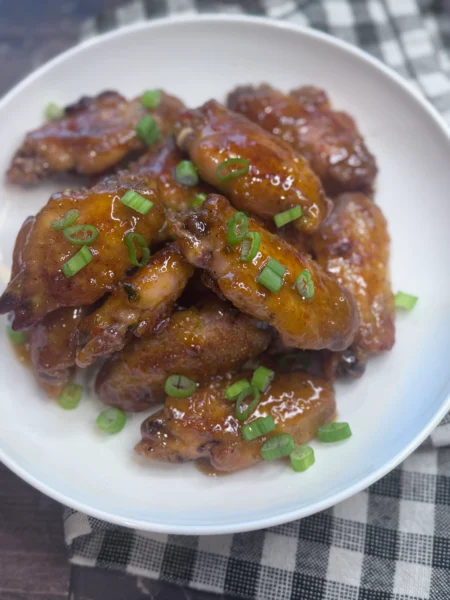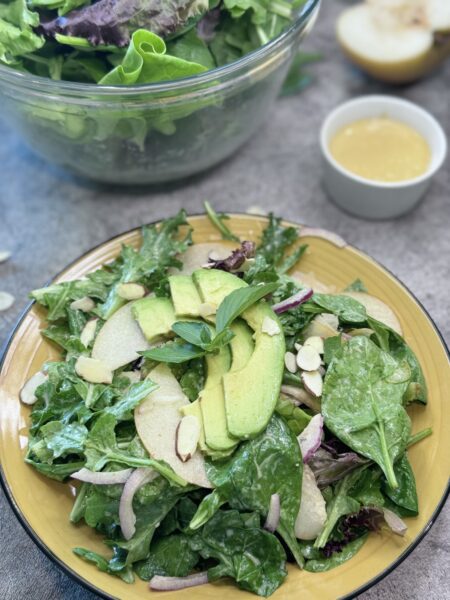For me, nothing is more comforting than a plate of meatballs and spaghetti. It invokes a carefree childhood and nostalgia like no other dish for me. My first time having this was actually in the school cafeteria, and immediately, I knew I was in love. Who doesn’t love long slippery noodles in a warm tomato sauce topped with cheese?
While this dish may seem quintessentially Italian, it is not. This dish is purely an American-invented dish. In fact, many restaurants in Italy don’t even serve meatballs and spaghetti. So where did this popular dish come from and who invented it?

HISTORY OF MEATBALLS
Meatballs aren’t just exclusive to Italian cuisine. Many countries and cultures have their versions of meatballs. For example, Vietnamese meatballs are called bo vien. China has lion’s head, and Sweden has kottbullar. The concept of combining ground meat with other ingredients to form a compact ball can be traced back to ancient civilizations. In ancient Rome, meatballs were called isicia omentata and were made by mixing minced beef or pork with breadcrumbs, wine-soaked bread, and a variety of seasonings. It was then boiled, roasted, or even deep-fried and only enjoyed by the upper class.
The Roman Empire’s trade routes eventually brought meatballs to ancient China, where they were known as rou wan, a popular dish during the Han Dynasty. Here, the ground meat was combined with cooked rice, millet, or even vegetables. Seasonings consisted of soy sauce, ginger, and a variety of aromatic herbs. They were often steamed or pan-fried and served with dipping sauces.
The Italian Influence
In Italy, meatballs are known as polpette and are most often a stand-alone dish. They are also served sauceless and are much smaller than the meatballs we know in America. In Northern Italy, meatballs are typically made with a combination of ground beef and breadcrumbs and are flavored with regional herbs like parsley, oregano, and a bit of garlic. They are often served in a tomato-based sauce alongside pasta.
In the Southern regions such as Sicily and Campania, the meatballs can include ground pork and veal and are larger and more flavorful. Herbs like basil and oregano are added and often enriched with grated Parmesan cheese or soaked bread. It is served with a variety of sauces, such as marinara or hearty ragu.
The Swedish Influence
Swedish meatballs are known as kottbullar and have gained international recognition thanks to the popular furniture brand IKEA. It is usually made with a combination of ground beef and pork, although vel or game can also be added. It is seasoned with breadcrumbs, chopped onions, and a variety of spices such as allspice and nutmeg, giving it its signature flavor. Eggs and cream are typically added to bind the mixture and form the balls.
It is usually pan-fried in butter and finished in a gravy made of beef broth, cream, and drippings from the pan. It is accompanied by Lingonberry sauce, a sweet-tart flavor, providing a contrast to the umami richness of the meatballs. It’s also served with mashed potatoes or lingonberry jam.
Global Influence
In Spain, meatballs are called albondigas are are typically made with ground beef, pork, or veal mixed with breadcrumbs, garlic, eggs, and herbs. It’s cooked in a tomato sauce and served with rice or crusty bread.
Asian cultures have their versions as well. In Thailand, fish balls are a popular street food made from a paste of minced fish, mixed with herbs and spices and served in soups, stir-fries, or skewers with dipping sauces. In China, lion’s head meatballs are made of ground pork water chestnuts, ginger, and other seasonings. They are served in a savory sauce along with vegetables, symbolizing the lion’s head and mane.
Kofta is a meatball found in the Middle East and Mediterranean countries. It is made by combining ground meat, such as lamb, beef, or a mixture of both with chopped onions, garlic, and a variety of herbs and spices such as cumin, coriander, paprika, and mint. It is shaped into an elongated meatball or formed onto skewers for grilling. It is often served with rice, flatbreads, or accompanied by yogurt-based sauces such as tzatziki or tahini.
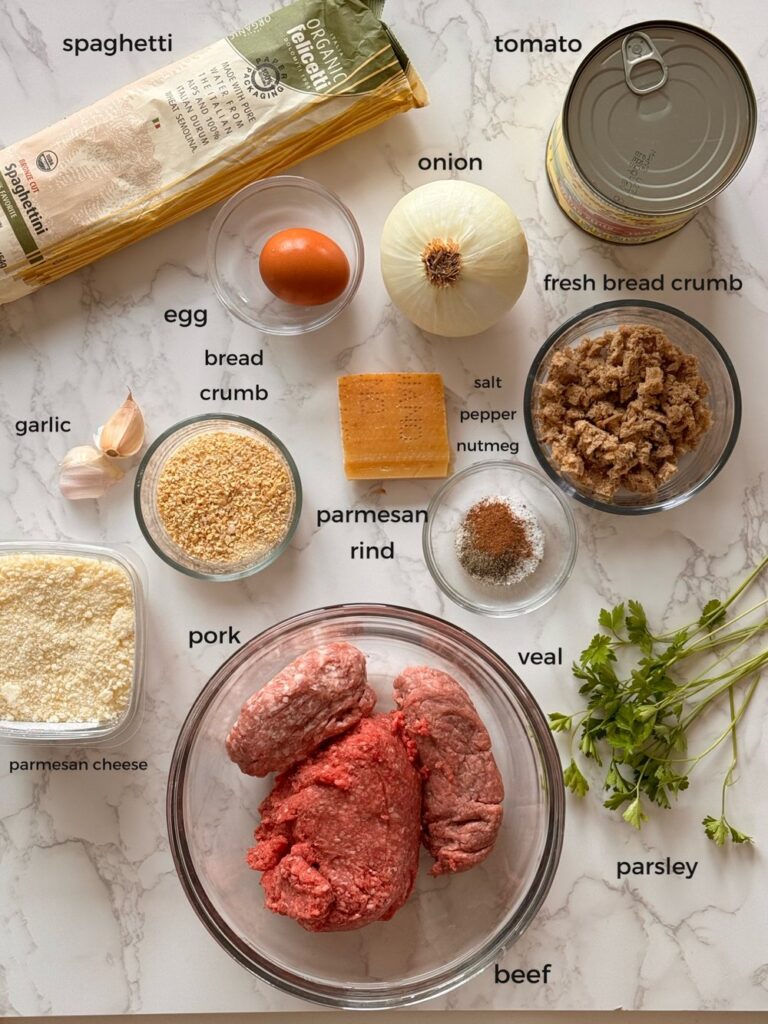
THE TRIP TO AMERICA
In the late 19th and early 20th century, Italian immigrants arrived in America, bringing with them the recipes that had been in their families for generations. In Italian-American cuisine, meatballs were often made with ground beef, pork, and veal. Breadcrumbs, eggs, grated cheese, garlic, parsley, and oregano were added and the mixture was formed into a ball. These meatballs were typically simmered in a tomato-based sauce and served with pasta or eaten in a meatball sub, a sandwich made with a crusty roll and topped with melted cheese.
The meatball eventually evolved as many American cooks started experimenting using local flavors. In Louisiana, many meatballs are seasoned with cayenne pepper and Cajun seasoning for a bold and spicy flavor. In the Midwest, meatballs are often served as an appetizer, such as grape jelly meatballs or sweet and sour meatballs.
THE RECIPE
This recipe courtesy of Ina Garten is the best spaghetti and meatball recipe I have ever run across. I love the idea of using three types of ground meat-beef, pork, and veal to make the meatballs. It produces a very flavorful meatball and holds up nicely in the marinara sauce. I did add a parmesan cheese rind to the sauce as it produces a more savory creamy sauce.
WHAT YOU WILL NEED:
For the Meatball
- 1/2 pound ground veal
- 1/2 pound ground pork
- 1 pound ground beef
- 1 cup fresh white bread crumbs (4 slices, crusts removed)
- 1/4 cup seasoned dry bread crumbs
- 2 tablespoons chopped fresh flat-leaf parsley
- 1/2 cup freshly grated Parmesan cheese
- 2 teaspoons Kosher salt
- 1/2 teaspoon freshly ground black pepper
- 1/4 teaspoon ground nutmeg
- 1 extra-large egg, beaten
- Vegetable oil
- Olive oil
For the Sauce
- 1 tablespoon good olive oil
- 1 cup chopped yellow onion (1 onion)
- 1 1/2 teaspoons minced garlic
- 1/2 cup good red wine, such as Chianti
- 1 (28-ounce) can crushed tomatoes, or plum tomatoes in puree, chopped
- 1 can (15 oz) tomato sauce
- 1 tablespoon fish sauce
- 1 tablespoon chopped fresh flat-leaf parsley
- 1 1/2 teaspoon Kosher salt
- 1/2 teaspoon freshly ground black pepper
For Serving
- 1 1/2 pounds spaghetti, cooked according to package directions
- Freshly grated Parmesan
Equipment Needed:
- grater, to grate parmesan
- large bowl (to mix meats)
- fork
- 12-inch skillet, 1/4 inch depth
- plate covered with paper towels
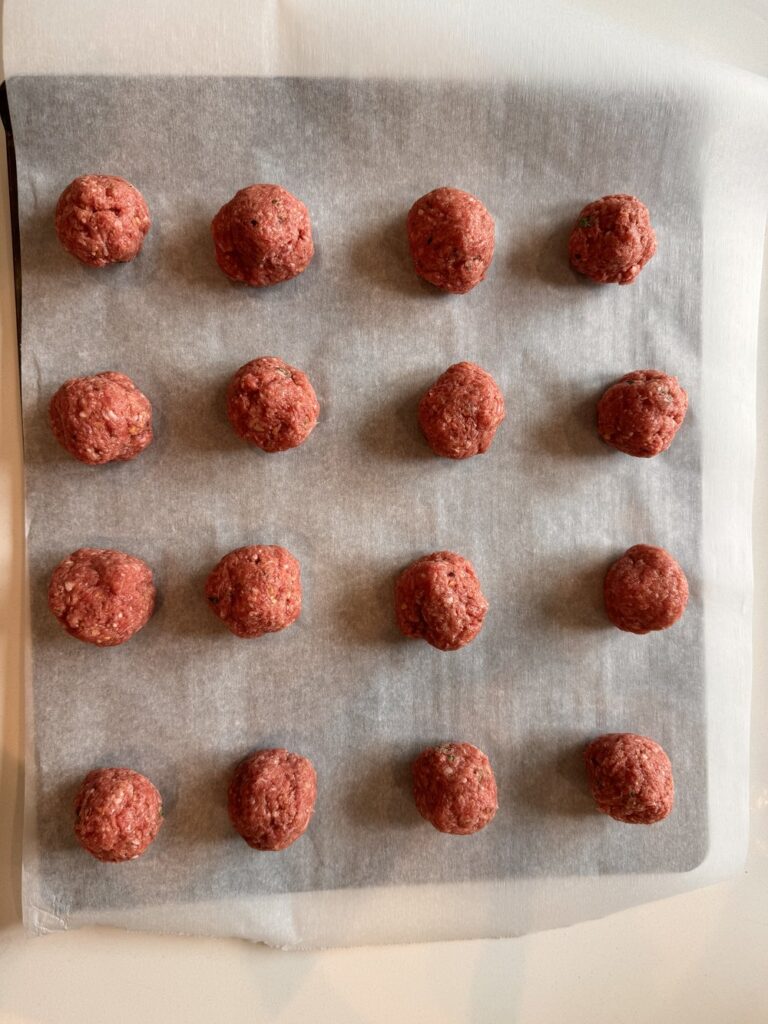
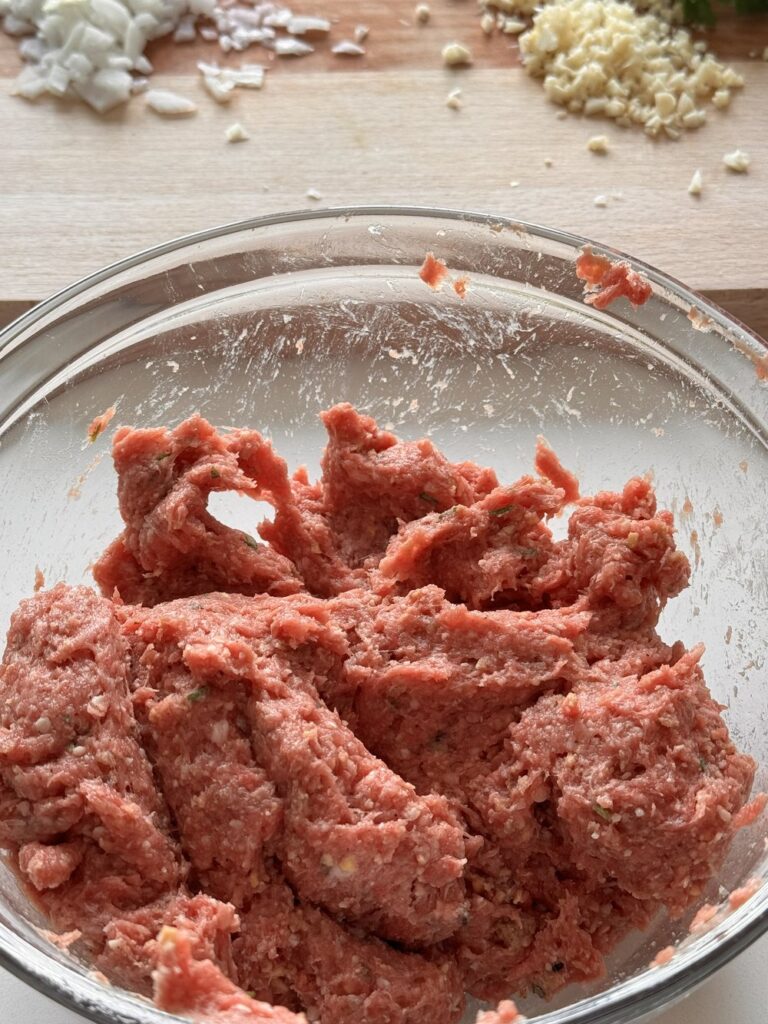
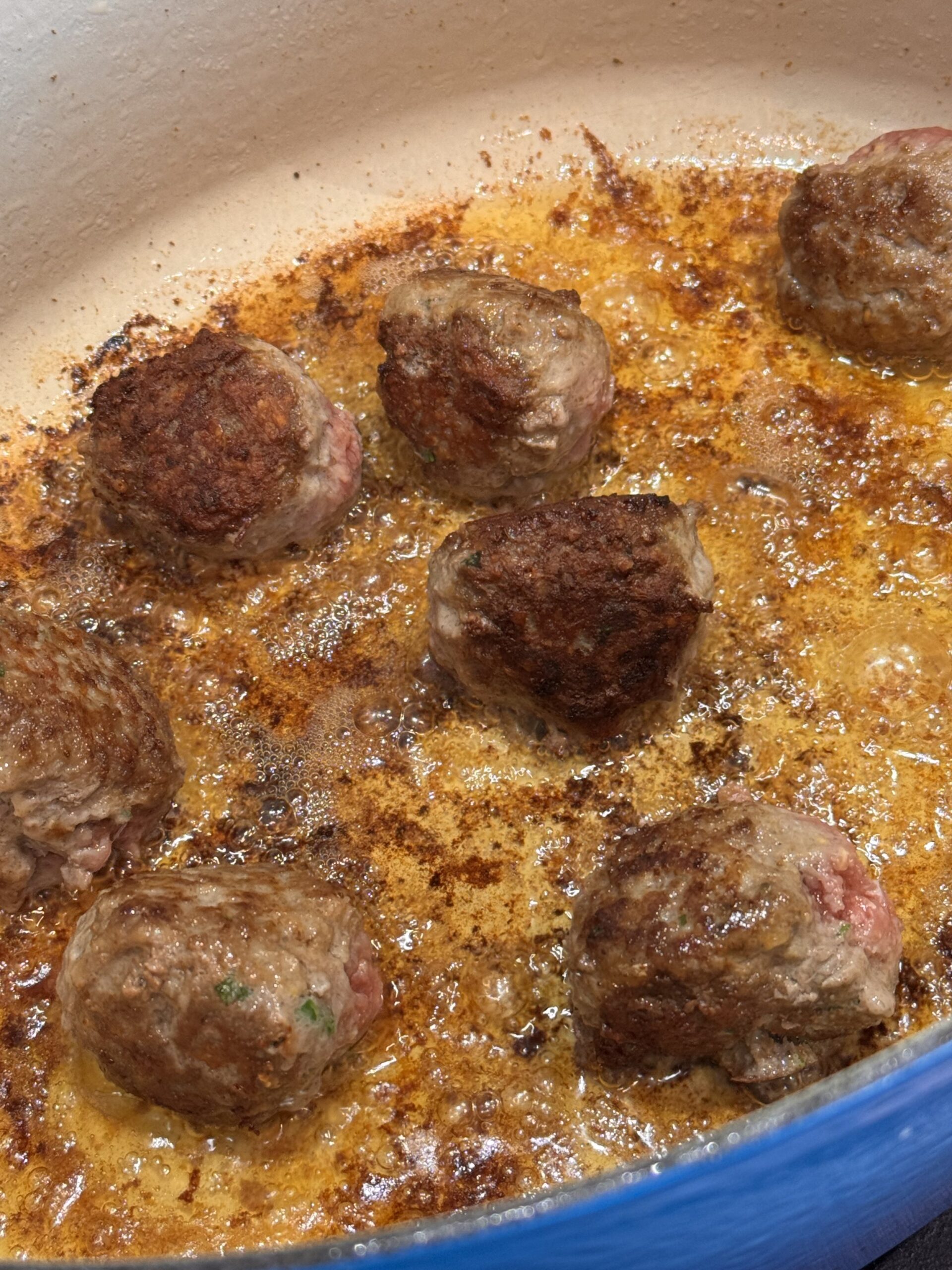
Step 2:
Pour equal amounts of vegetable oil and olive oil into a large (12-inch) skillet to a depth of 1/4-inch. Heat the oil. Very carefully, in batches, place the meatballs in the oil and brown them well on all sides over medium-low heat, turning carefully with a spatula or a fork. This should take about 10 minutes for each batch. Don’t crowd the meatballs. Remove the meatballs to a plate covered with paper towels. Discard the oil but don’t clean the pan.
Step 3:
For the sauce, heat the olive oil in the same pan. Add the onion and saute over medium heat until translucent, 5 to 10 minutes. Add the garlic and cook for 1 more minute. Add the wine and cook on high heat, scraping up all the brown bits in the pan, until almost all the liquid evaporates about 3 minutes. Stir in the tomatoes, tomato sauce, fish sauce, parsley, salt, and pepper.
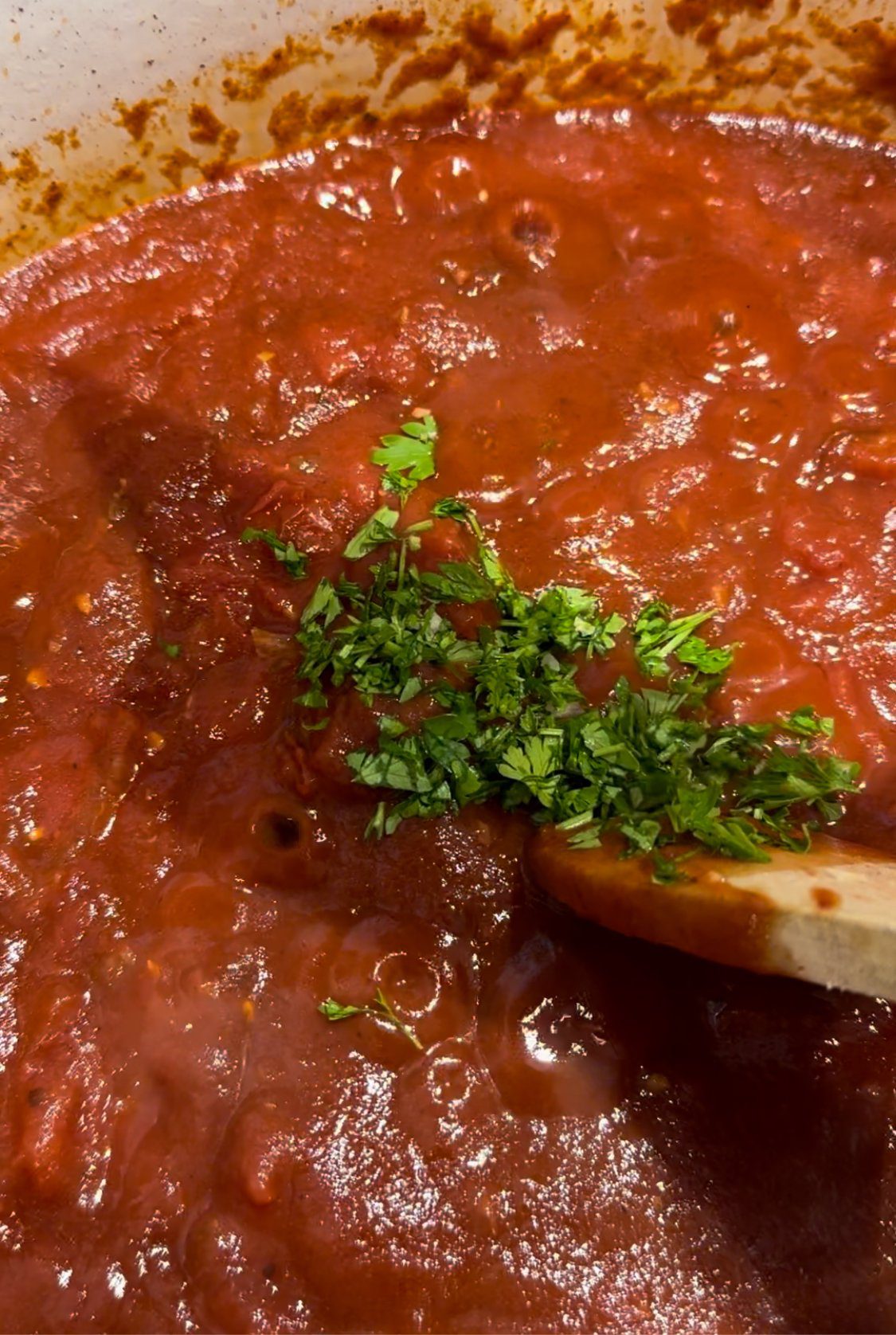
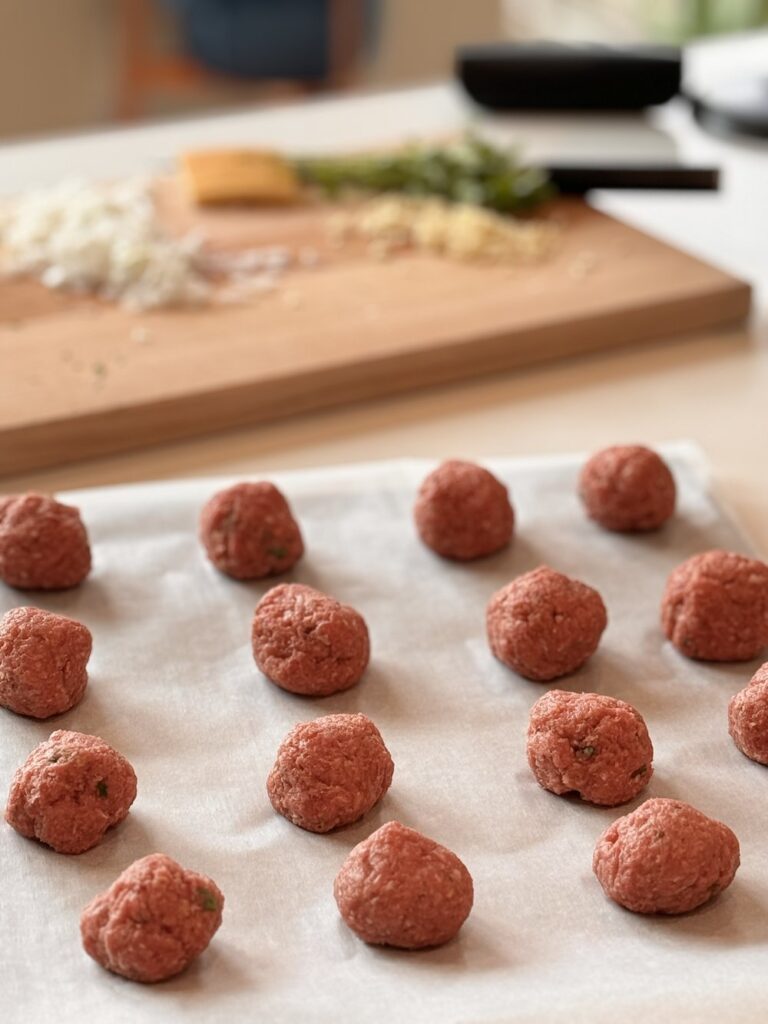
Step 4:
Return the meatballs to the sauce, cover, and simmer on the lowest heat for 25 to 30 minutes, until the meatballs are cooked through. Serve hot on cooked spaghetti and pass the grated Parmesan.
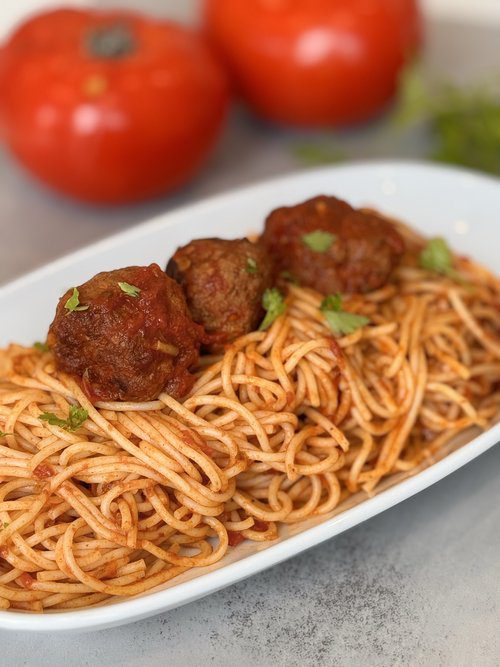
✅ Quick Tips: Read the recipe in its entirety before you start cooking. This will help you understand the ingredients, steps, and timing involved, and allow you to prepare any necessary equipment or ingredients beforehand.
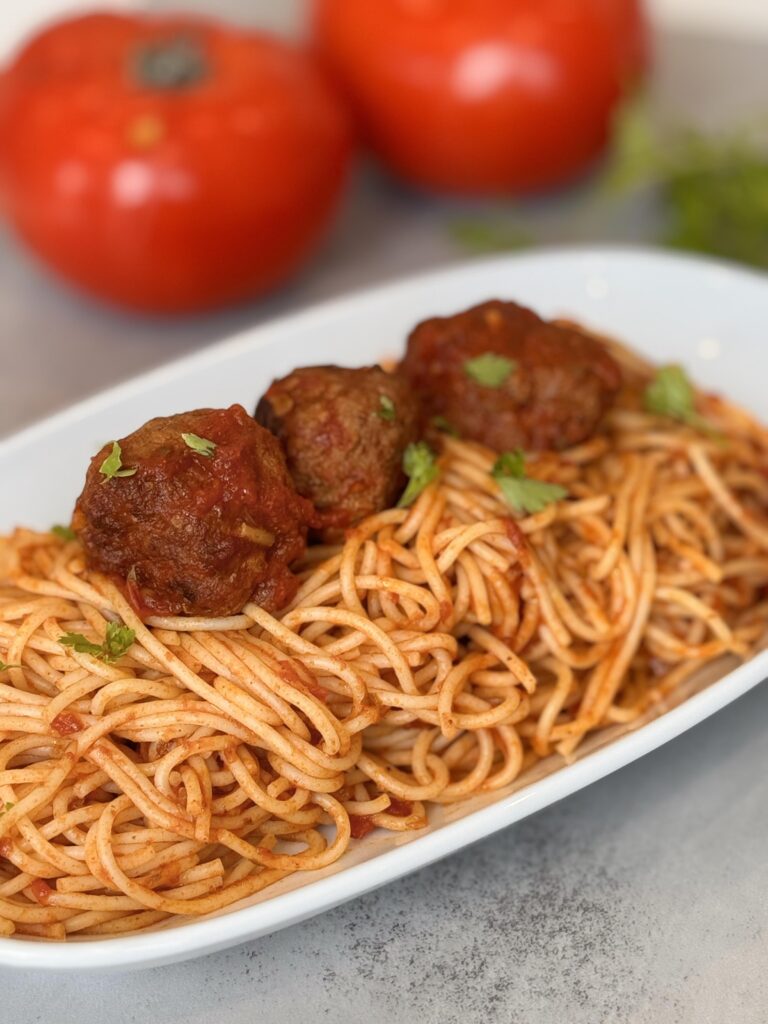
Spaghetti and Meatballs
Ingredients
For the Meatball
For the Sauce
Nutritional Value
Nutritional Value
Servings 4
- Amount Per Serving
- Calories 885kcal
- % Daily Value *
- Total Fat 49g76%
- Saturated Fat 18g90%
- Trans Fat 1g
- Cholesterol 217mg73%
- Sodium 3776mg158%
- Potassium 1776mg51%
- Total Carbohydrate 51g17%
- Dietary Fiber 8g32%
- Sugars 17g
- Protein 56g113%
- Calcium 359 mg
- Iron 9 mg
* Percent Daily Values are based on a 2,000 calorie diet. Your daily value may be higher or lower depending on your calorie needs.






